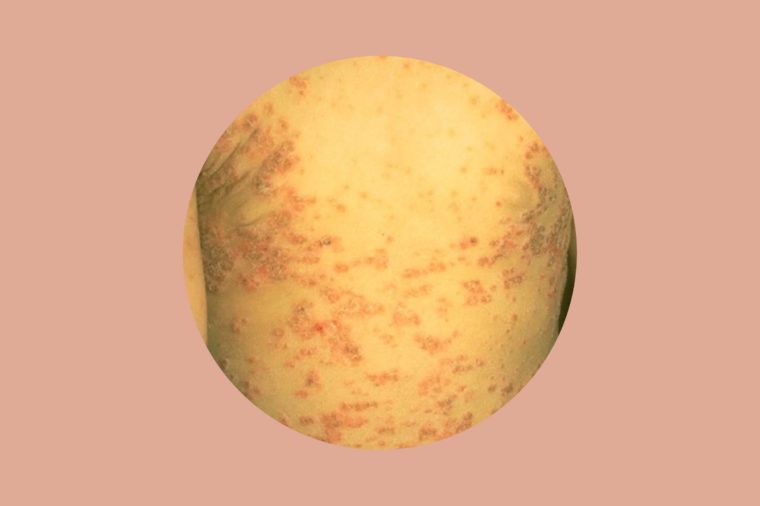Guttate psoriasis is a common skin condition

It often comes hand in hand with other illnesses
“Guttate psoriasis can commonly be linked to upper respiratory infections (URI), particularly streptococcal (strep) infections,” says Mohiba Tareen, MD, a dermatologist at Tareen Dermatology. “Sixty-six percent of those with an acute guttate psoriasis flare had a clear history of a recent severe URI. The science shows that strep infections can activate immune cells called T lymphocytes that then ‘turn on’ psoriasis in genetically predisposed individuals.” Generally, the rash appears a few weeks after the illness that caused it subsides.
Stress—or simple skin injuries—can also cause a flare-up
“Stress, injury to the skin, sunburn, and rarely, medications may precipitate an attack of guttate psoriasis on susceptible individuals,” says Melanie Palm, MD, MBA, board-certified dermatologist and cosmetic surgeon from Art of Skin MD, in San Diego. For quick relief, try these all-natural psoriasis remedies you can make at home.
It can become a chronic issue
“For many cases of guttate psoriasis related to an infection, especially strep, it is likely to clear once the strep has been effectively treated,” says Dr. Palm. “Oftentimes, the guttate psoriasis does not return.” People under 30 years old are most likely to develop guttate psoriasis, according to the Mayo Clinic. However, your age may be a factor in whether it is cured or becomes a chronic condition. Dr. Tareen explains that children with guttate psoriasis may be in remission over a matter of months or even weeks. Unfortunately, the prognosis isn’t as promising for adults. The condition could become chronic or flare up with subsequent strep or viral infections.
It can turn into plaque psoriasis
Some people with guttate psoriasis have a hard time staying in remission, and it can develop into plaque psoriasis. A 2010 study found that people who were older when they developed guttate psoriasis—and those with a family history of plaque psoriasis—were more likely to develop plaque psoriasis.
Medications can help

Lifestyle changes can help reduce recurrence
“Lingering infections, stress, physical injury—a phenomenon called Koebner reaction—alcohol use, and excessive weight may worsen psoriasis,” Dr. Palm says. Improving your overall health can help reduce the risk of a flareup. Take precautions by avoiding these foods that could make your psoriasis worse.
The post 7 Things Dermatologists Want You to Know About Guttate Psoriasis appeared first on Reader's Digest.
from Reader's Digest http://ift.tt/2BE7vnd
ليست هناك تعليقات:
إرسال تعليق